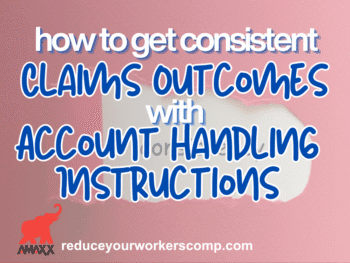Some litigation can drag on forever. As time goes by, the expense of litigation keeps piling up and between attorney fees, expert fees, lost worker wages, and medical expenses it can seem like the case is going nowhere. Below are some ways to speed up the process and get those cases settled and off your loss run.
1. Report New Litigation Promptly to Your Carrier
Sometimes the first notice of an injury is a Notice For Hearing. These may come from past employees or current ones. Since carriers usually have a dedicated adjuster just for litigation the sooner the new litigation notice arrives at the carrier’s office the better. Be sure to send the carrier all documentation and follow it up with a phone call or email to make sure the proper person received it. (open-ended) (WCxKit)
2. Get the Complete Personnel File Over to Your Carrier – fast.
If the first notice of injury is a hearing notice, both the carrier and you share the same information — the hearing notice. The adjuster calls the employer first as part of the investigation, so be prepared having the claimant’s personnel file pulled, copied, and ready for mailing. Include anything else pertinent to the claim, such as safety records, job applications, any disciplinary write-ups, time sheets, medical records or invoices, and so on that may be helpful to the investigation. Also send the claimant’s job description and any witness or coworker statements just to cover all bases. Work on your defense before the first hearing.
3. Once Counsel is Assigned, Give Them a Call
The counsel on the case may have different questions than the adjuster, and you should make contact to make sure you know what is needed and to keep the attorney up to date. Counsel may know nothing about your company and has no idea what your jobs include. It is helpful to educate the attorney about your company and what the medical/wage exposure could be.
4. Don’t Abandon the Claim for Counsel to Handle
Be proactive. Sometimes when a case is in litigation little follow-up is done until after a hearing date and then only to find out the next hearing date. Leave yourself notes to follow up with the attorney on a regular basis to be sure you know what is currently going on and what is coming in the near future. That way you are kept up to date, and can address any concerns raised on a timely basis.
Note: if you do not have a solid litigation management system to manage every aspect of your lawsuits (whatever type that might be) you should consider putting one in place so that YOU, the employer, manages them.
Sometimes, depending on the size of the case, adjusters overlook the seriousness of a claim. As mentioned before, carriers employ litigation adjusters who tend to focus on the larger, more exposure-heavy claims. That shouldn’t mean your claim is not important and shouldn’t be handled proactively. Being involved on all ends pushes your claim to resolution.
5. Make Yourself Available to Testify as a Witness
Nobody knows the ins and outs of the job duties as you, the employer, do. So, get both counsel and carrier good detailed job descriptions. In medical reports, the claimant may tell the doctor one thing, and the truth may be totally opposite. It is not unusual for claimants to inflate their job duties which lead them to injury and your testimony can be helpful is putting the tasks they did at their job back into reality. This helps the defense of your claim and shows you, as the employer, are involved in all aspects of the claim.
6. Ask Your Current Employees What They Have Heard About the Lawsuit
In smaller communities it is common for everyone to know a lot about everyone else. Most times depending your relationship with the claimant and the claimant relationship with other workers, information may can be hard to gather. But chances are, someone knows something so its worth checking out.
7. Look at Other Information You Know About the Claimant that Could be Helpful
Other types on information can include the type of house the claimant has; hobbies; type of car; what the spouse or relatives do for employment; bars/restaurants frequented, etc. Surveillance may be initiated to get a gauge on the claimant’s activity level. The more information provided the better the result of litigation. (open-ended)
8. Be Open to Settlement Early on in the Case
No matter how hard you defend a claim; sometimes the only option is to settle the case. Carriers take fewer cases to trial because of the risk of losing and incurring the full costs of medical and wage exposure. At times it is best to come up with a global settlement. While only pertaining to certain cases, be open to early settlement. Early settlement decreases defense costs, and speeds up the process. Pick and choose your battles. If the case doesn’t entail a lot of complications and is fairly straightforward, the sooner you can get rid of it the better. Who wants to spend $5,000 defending a case worth $2,500? (WCxKit)
Note: Some companies make a practice of settling in only the most extraordinary and clear-cut circumstances because they fear it sets a bad precedent for future claims.
Summary
Litigation costs for Insurance claims can be quite daunting, but if you handle them promptly and gather as much information as you can early on, the process can be speeded up generally end up in resolution earlier rather than just send the case on to counsel and leave it up to the attorney to take care of it. Be sure to stay involved in all aspects, and make yourself available in whatever facet needed to resolve the case and get it off the books.
Author Rebecca Shafer, JD, President of Amaxx Risks Solutions, Inc. is a national expert in the field of workers compensation. She is a writer, speaker, and website publisher. Her expertise is working with employers to reduce workers compensation costs, and her clients include airlines, healthcare, printing/publishing, pharmaceuticals, retail, hospitality, and manufacturing. See www.LowerWC.com for more information. Contact:RShafer@ReduceYourWorkersComp.com or 860-553-6604.
WORK COMP CALCULATOR: http://www.LowerWC.com/calculator.php
SUBSCRIBE: Workers Comp Resource Center Newsletter
Do not use this information without independent verification. All state laws vary. You should consult with your insurance broker or agent about workers comp issues.
©2011 Amaxx Risk Solutions, Inc. All rights reserved under International Copyright Law. If you would like permission to reprint this material, contact Info@ReduceYourWorkersComp.com

























